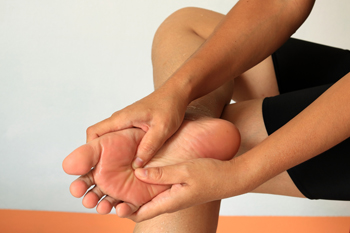 Many people experience several forms of foot pain. This may be a result of spending the majority of the day walking or standing. A common foot ailment is known as athlete’s foot, and is considered to be a fungal infection of the skin. The symptoms that are associated with this condition consist of itching or blisters between the toes, and the soles of the feet may peel and appear red. Wearing shoes that fit poorly is a cause of ingrown toenails, and this condition can produce considerable pain and discomfort. In severe cases, there can be drainage from the toenail which can indicate an existing infection. A bony protrusion on the side of the big toe is indicative of a bunion. A common cause of this is wearing shoes that are too narrow. Additionally, if there is a family history of bunions, the chances of developing this ailment may increase. If you are having any type of foot pain, it is suggested that you schedule a consultation with a podiatrist who can properly treat any foot condition.
Many people experience several forms of foot pain. This may be a result of spending the majority of the day walking or standing. A common foot ailment is known as athlete’s foot, and is considered to be a fungal infection of the skin. The symptoms that are associated with this condition consist of itching or blisters between the toes, and the soles of the feet may peel and appear red. Wearing shoes that fit poorly is a cause of ingrown toenails, and this condition can produce considerable pain and discomfort. In severe cases, there can be drainage from the toenail which can indicate an existing infection. A bony protrusion on the side of the big toe is indicative of a bunion. A common cause of this is wearing shoes that are too narrow. Additionally, if there is a family history of bunions, the chances of developing this ailment may increase. If you are having any type of foot pain, it is suggested that you schedule a consultation with a podiatrist who can properly treat any foot condition.
Foot Pain
Foot pain can be extremely painful and debilitating. If you have a foot pain, consult with Dr. Tina Oliver from Astro Foot Care, PA. Our doctor will assess your condition and provide you with quality foot and ankle treatment.
Causes
Foot pain is a very broad condition that could be caused by one or more ailments. The most common include:
Diagnosis
To figure out the cause of foot pain, podiatrists utilize several different methods. This can range from simple visual inspections and sensation tests to X-rays and MRI scans. Prior medical history, family medical history, and any recent physical traumatic events will all be taken into consideration for a proper diagnosis.
Treatment
Treatment depends upon the cause of the foot pain. Whether it is resting, staying off the foot, or having surgery; podiatrists have a number of treatment options available for foot pain.
If you have any questions, please feel free to contact our office located in Houston, TX. We offer the newest diagnostic and treatment technologies for all your foot care needs.
Read more about Foot Pain
Don't let bunions interfere with your daily activities.
 Research has indicated many ballet dancers are afflicted with ingrown toenails. This is often the result of balancing on top of the toes, which can cause the corner of the nail to grow into the surrounding skin. An ingrown toenail typically causes pain and discomfort and may become infected if it is not treated promptly. Many ballet dancers may notice soreness while putting on ballet slippers and pointing the toes can cause extreme pain. Some of the symptoms associated with ingrown toenails can include swelling around the nail, or you may notice a discharge draining from the nail. Mild relief can be found when the toe is soaked in warm water and is helpful in softening the skin around the affected area. If you feel you have an ingrown toenail, consult with a podiatrist so proper treatment can begin.
Research has indicated many ballet dancers are afflicted with ingrown toenails. This is often the result of balancing on top of the toes, which can cause the corner of the nail to grow into the surrounding skin. An ingrown toenail typically causes pain and discomfort and may become infected if it is not treated promptly. Many ballet dancers may notice soreness while putting on ballet slippers and pointing the toes can cause extreme pain. Some of the symptoms associated with ingrown toenails can include swelling around the nail, or you may notice a discharge draining from the nail. Mild relief can be found when the toe is soaked in warm water and is helpful in softening the skin around the affected area. If you feel you have an ingrown toenail, consult with a podiatrist so proper treatment can begin.
Ingrown toenails can become painful if they are not treated properly. For more information about ingrown toenails, contact Dr. Tina Oliver of Astro Foot Care, PA. Our doctor can provide the care you need to keep you pain-free and on your feet.
Ingrown Toenails
Ingrown toenails occur when a toenail grows sideways into the bed of the nail, causing pain, swelling, and possibly infection.
Causes
Prevention
Because ingrown toenails are not something found outside of shoe-wearing cultures, going barefoot as often as possible will decrease the likeliness of developing ingrown toenails. Wearing proper fitting shoes and using proper cutting techniques will also help decrease your risk of developing ingrown toenails.
Treatment
Ingrown toenails are a very treatable foot condition. In minor cases, soaking the affected area in salt or antibacterial soaps will not only help with the ingrown nail itself, but also help prevent any infections from occurring. In more severe cases, surgery is an option. In either case, speaking to your podiatrist about this condition will help you get a better understanding of specific treatment options that are right for you.
If you have any questions please feel free to contact our office located in Houston, TX. We offer the newest diagnostic and treatment technologies for all your foot and ankle needs.
Read more about Ingrown Toenail Care The location of a plantar wart is on the sole of the foot. It often develops in the heel area of the foot and grows into the skin. This is a result of consistent weight that is put on the heel while walking or standing. The fungus that causes this type of wart is known as the human papillomavirus (HPV) and is considered to be contagious. Some of the symptoms that are associated with this condition include a hard and callused area on the heel of the foot, and pain while bearing weight on the foot. Additionally, clotted blood vessels will often appear in the center, which look like tiny black dots. This type of fungus thrives in warm and moist places, which include public swimming pools and surrounding areas, and can easily spread by sharing socks or towels. If you would like information about proper treatment options for a plantar’s wart, please counsel with a podiatrist.
The location of a plantar wart is on the sole of the foot. It often develops in the heel area of the foot and grows into the skin. This is a result of consistent weight that is put on the heel while walking or standing. The fungus that causes this type of wart is known as the human papillomavirus (HPV) and is considered to be contagious. Some of the symptoms that are associated with this condition include a hard and callused area on the heel of the foot, and pain while bearing weight on the foot. Additionally, clotted blood vessels will often appear in the center, which look like tiny black dots. This type of fungus thrives in warm and moist places, which include public swimming pools and surrounding areas, and can easily spread by sharing socks or towels. If you would like information about proper treatment options for a plantar’s wart, please counsel with a podiatrist.
Plantar warts can be very uncomfortable. If you need your feet checked, contact Dr. Tina Oliver from Astro Foot Care, PA. Our doctor will assist you with all of your foot and ankle needs.
About Plantar Warts
Plantar warts are the result of HPV, or human papillomavirus, getting into open wounds on the feet. They are mostly found on the heels or balls of the feet.
While plantar warts are generally harmless, those experiencing excessive pain or those suffering from diabetes or a compromised immune system require immediate medical care. Plantar warts are easily diagnosed, usually through scraping off a bit of rough skin or by getting a biopsy.
Symptoms
Treatment
To help prevent developing plantar warts, avoid walking barefoot over abrasive surfaces that can cause cuts or wounds for HPV to get into. Avoiding direct contact with other warts, as well as not picking or rubbing existing warts, can help prevent the further spread of plantar warts. However, if you think you have developed plantar warts, speak to your podiatrist. He or she can diagnose the warts on your feet and recommend the appropriate treatment options.
If you have any questions please feel free to contact our office located in Houston, TX. We offer the newest diagnostic and treatment technologies for all your foot and ankle needs.
Read more about All About Plantar Warts